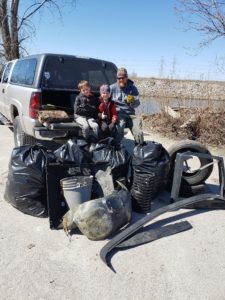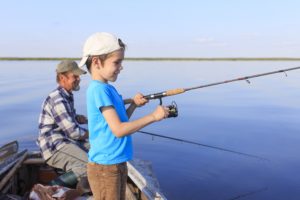What is Responsible Recreation?
You may have seen hashtags popping up on your social media feeds that contain some variation of the phrase “responsible recreation”. These hashtags may have served as captions for images of people enjoying nature or recreating outdoors in some way, but the meaning of the hashtag goes far beyond just enjoying Michigan’s natural resources.

Local fisherman and his family clean up a boat launch on the Saginaw Bay.
Becoming more popular among fishing and hunting groups on social media early this year, the hashtag #responsiblerecreation can refer to a number of things. Recreating responsibly could mean being courteous towards other recreationists and the natural resources you enjoy. Or it could mean packing out your belongings and not polluting an area by leaving litter behind. Sportsmen and sportswomen have long been responsible for setting good stewardship standards for other natural resource user groups, and this hashtag aimed to highlight the positive actions of individuals who were ensuring their beloved natural resources were in good hands.
When the COVID-19 pandemic reached Michigan and state-wide closures were put in place, the hashtag # responsiblerecreation began to take on additional meaning. In a time of social distancing and limited travel, spending time in the outdoors became more important than ever. However, it was critical that individuals needed to be able to exercise their rights to enjoy the outdoors in a way that did not infringe upon the health and well-being of their fellow Michiganders.

A young angler recreating with family.
Then, responsible recreation also included following the “Stay Home. Stay Safe. Save Lives.” order and enjoying natural resources in a way that kept us close to home and following social distancing guidelines. Due to the diligence of many sportsmen, sportswomen and outdoor enthusiasts of all kinds, we have been able to retain access to many of our public lands and waters during these unprecedented times.
Responsible recreation takes on many forms and is often molded by the experience of the individual practicing it. It can take the form of cleaning up a litter-filled parking lot at your favorite state game area or boat launch, harvesting game and foraging sustainably or only recreating in close proximity to members of your household. In simple terms, responsible recreation involves practicing good public land stewardship and being courteous toward fellow resource users.
No matter who you are or how you enjoy the outdoors, you should always recreate with the understanding that we are collectively responsible for ensuring Michigan’s natural resources remain healthy and available for future generations.
The post What is Responsible Recreation? appeared first on Michigan United Conservation Clubs.
Recent Posts



